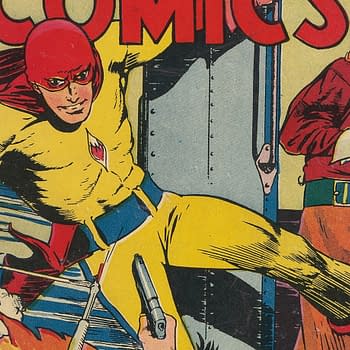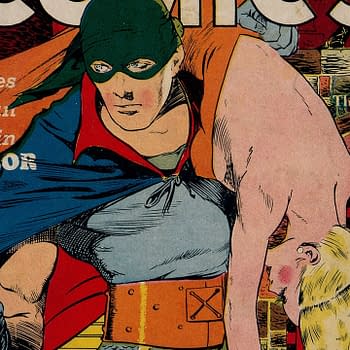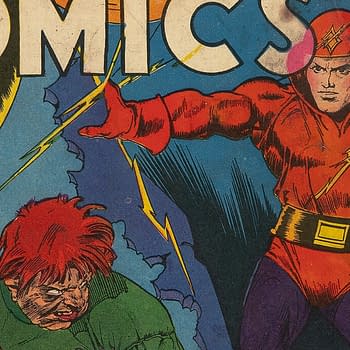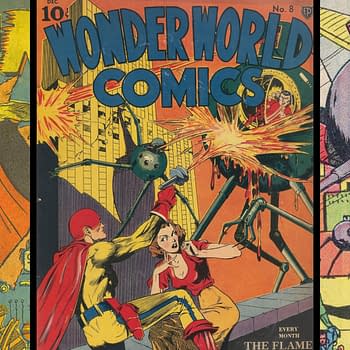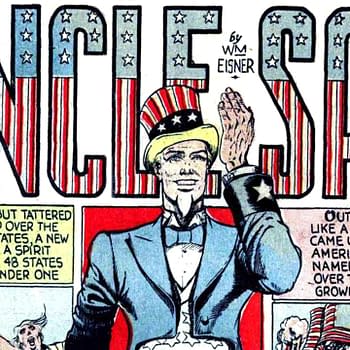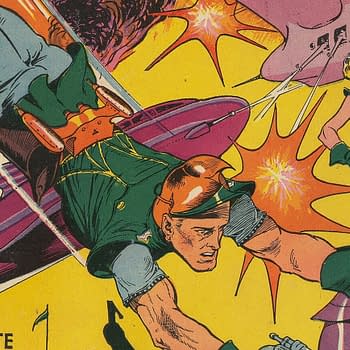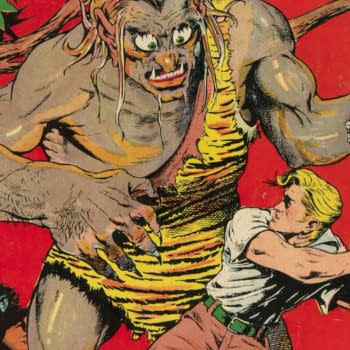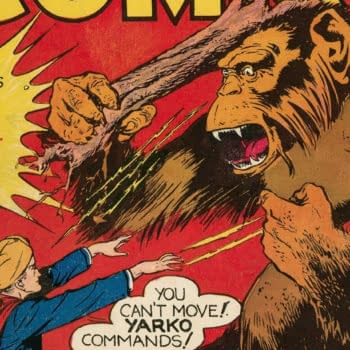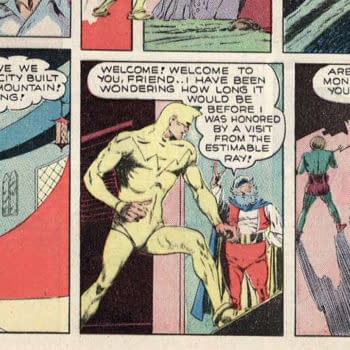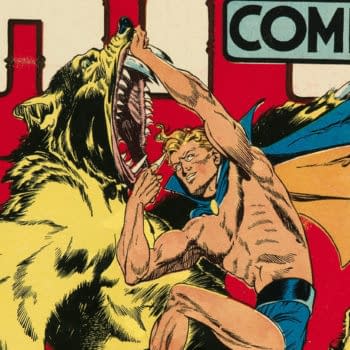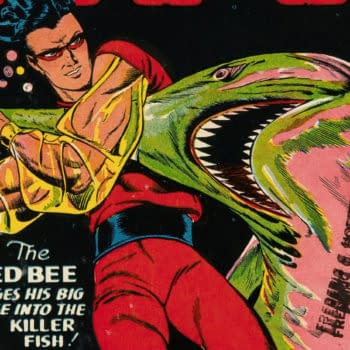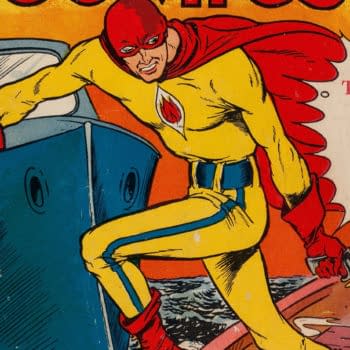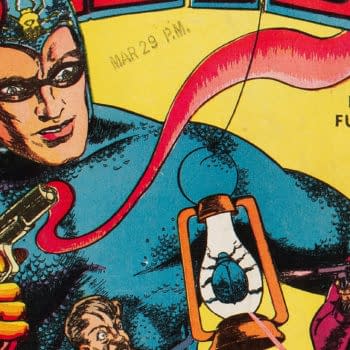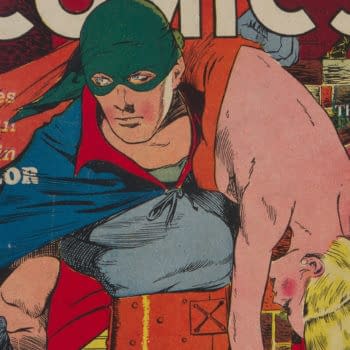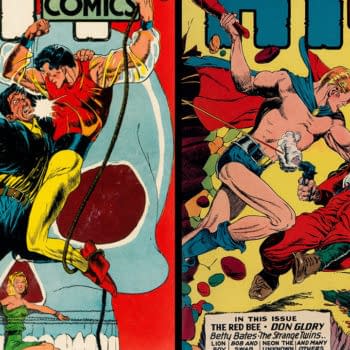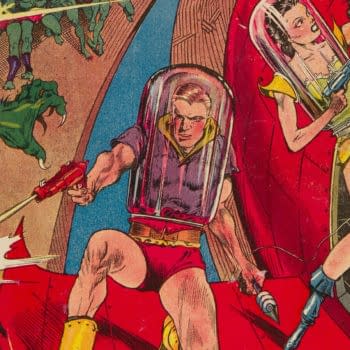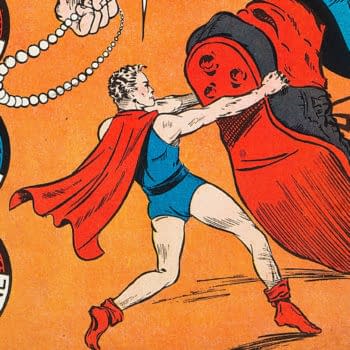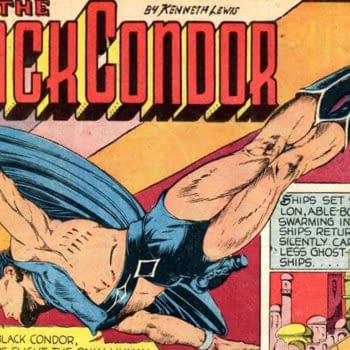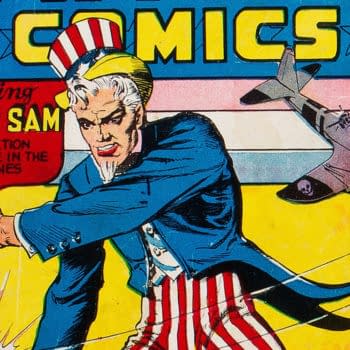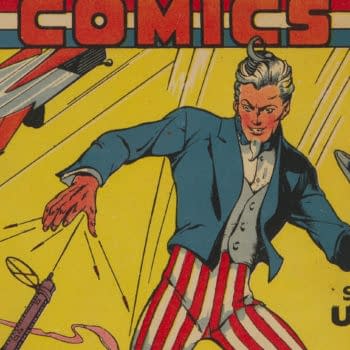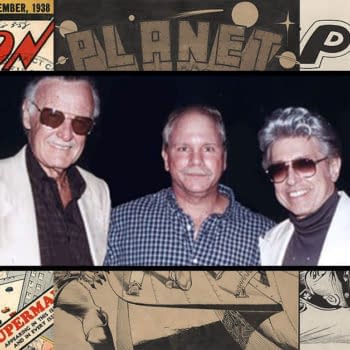Best remembered today for its cover by Lou Fine, the publication of Wonderworld Comics #6 in late August 1939 captures a powder-keg moment for both the comic book industry and the world. In hindsight, it's no surprise that these things are related. From that point forward, over the next few months, the comic book industry[...]
lou fine Archives
Mystery Men Comics #3 is best known for its spectacular Lou Fine cover featuring the Green Mask. Comics featuring Fine's covers are highly sought after on that basis alone, and virtually all the comics he worked on have historical importance for many other reasons as well. While Mystery Men Comics #3 features one of the[...]
The character is a fascinating blend of the popular "jungle girl" archetype (like Sheena) and the sci-fi/horror elements that were a Fox specialty.
A total of only 49 entries for Science Comics #1 appear on the CGC census currently, with only 37 of those as "Universal" unrestored. With a fantastic Lou Fine cover, a number of[...]
The cover of Wonderworld Comics #8 by Lou Fine is somehow an underappreciated classic among Golden Age science fiction comics. In the foreground, The Flame saves a terrified woman from a monstrous, multi-limbed mechanical quadruped that looms over them, its metallic tentacles reaching menacingly In the background, another mechanical monstrosity scales a building like a[...]
But such origin stories changed with the times. Fifteen years later, a completely different explanation of the name made the rounds, and these were certainly not the only theories. It's unlikely that the 1830 era version of the matter is correct — even though it has largely come to be the accepted history in recent[...]
Throughout a Golden Age lifespan that ran through Mystery Men Comics #1-24 and the attempted launch of his own series, Rex Dexter was only featured on three covers. Created by Dick Briefer, the character made his cover debut with Mystery Men Comics #2 with an underappreciated Lou Fine piece. While Fine is justifiably known for[...]
Although Sheena is the most famous character to be introduced to the American readership in the series, the character got little respect on the covers for the first few issues. She was relegated to a small inset on a few covers for Jumbo Comics #1-8, with varying costume designs, while the central image of these[...]
Wonderworld Comics #3 followed promptly in May without missing a beat. There's plenty to say about Victor Fox which we'll get to here in time, but he was a crafty operator and navigated this legal crisis very shrewdly. After an appeal, DC v Bruns was ultimately decided against Fox in April 1940, but he had[...]
"Busy" Arnold's Quality Comics, Smash Comics started out as an anthology featuring a fairly typical if well-executed mix of pulp-inspired adventure heroes and humor. But by issue #14, the superhero character The Ray was introduced in stories beautifully drawn by legendary artist Lou Fine. The character began to get periodic cover-features in the title by[...]
In previous discussions, we've seen that Lou Fine's Golden Age covers are often very closely tied to the interior stories of the issues in question His iconic cover for Hit Comics #5 is a key moment from the Red Bee story in that issue, for example. We've also seen that such covers sometimes ended up[...]
"Busy" Arnold's Quality Comics, Smash Comics started out as an anthology featuring a fairly typical if well-executed mix of pulp-inspired adventure heroes and humor. But by issue #14, the superhero character The Ray was introduced in stories beautifully drawn by legendary artist Lou Fine. The character began to get periodic cover-features in the title by[...]
Despite working on and co-creating numerous characters now considered obscure, Lou Fine was considered one of the best artists of the Golden Age. He was an artist that even other comic book greats admired, and his cover work for publishers Fox Feature Syndicate, Fiction House, and Quality Comics is still highly regarded by collectors to[...]
Initially, Eisner and Lou Fine's The Flame for Fox Feature Syndicate title Wonderworld Comics didn't have quite as much to do with fire as one might think either.
The creation of the costumed superhero version of the Flame was prompted by what can now be considered one of the most important sequences of events in American comic[...]
Like a lot of superheroes, especially in the Golden Age, his origin evolved over time, and the character's backstory was fleshed out considerably during the course of the new series. While much of the focus for collectors has remained on the character's early Mystery Men appearances, the Blue Beetle title itself contains important material by[...]
Lou Fine is one of the most important and influential artists of the Golden Age of comics. A creator who made his mark on characters ranging from Black Condor and the Ray to Uncle Sam and the Spirit, Fine was an artist that others of his generation admired. Fellow Golden Age legend Joe Simon called[...]
Lou Fine was considered one of the best artists of the Golden Age, and it's easy to see why. He could handle any subject matter with ease, including superheroes, science fiction, fantasy, pulp action, and anything else that was thrown at him. Some characters and title runs might now be considered obscure, except that Lou[...]
Despite working on and co-creating numerous characters now considered obscure, Lou Fine was considered one of the best artists of the Golden Age. He was an artist that even other comic book greats admired, and his cover work for publishers Fox Feature Syndicate, Fiction House, and Quality Comics is still highly regarded by collectors to[...]
Lasting 73 issues from January 1940 to Winter 1953, Planet Comics is the most important science fiction title in American comic book history. Almost 70 years after the conclusion of that run, the title continues to have an impact on mainstream pop culture. It's the go-to example for science fiction comic book art and imagery,[...]
Doll Man was the creation of Will Eisner and his earliest adventures were drawn by Eisner and fellow legendary artist Lou Fine The shrinking comic book character made his debut in Feature Comics #27. Considered Quality Comics' first super-powered character, it would appear that Quality Comics publisher Busy Arnold quickly figured out he had a[...]
The Black Condor story in Crack Comics #5 is a spectacular example of Lou Fine at his best Fine was an artist that even other comic book greats admired, and while his cover work for publishers Fox Feature Syndicate, Fiction House and Quality Comics is highly regarded by collectors, his interior story artwork is sometimes[...]
But such origin stories changed with the times. Fifteen years later, a completely different explanation of the name made the rounds, and these were certainly not the only theories. It's unlikely that the 1830 era version of the matter is correct — even though it has largely come to be the accepted history in recent[...]
But such origin stories changed with the times. Fifteen years later, a completely different explanation of the name made the rounds, and these were certainly not the only theories. It's unlikely that the 1830 era version of the matter is correct — even though it has largely come to be the accepted history in recent[...]
But some of last nights results from publishers like Fox, Lev Gleason, and Ace serve to highlight a trend that has been building over the past 2-3 years: The vintage indies have arrived (again) in the hearts and minds of vintage comics collectors.
Fantastic Comics #3 CGC 9.4 Edgar Church copy (Fox, 1940) — This comic book[...]
Session 1 included Original Artwork and comics from A-1 Comics to Amazing Spider-Man.
Jon Berk Collection Session 1 Artwork
The original art highlight of Jon Berk Collection Session 1 has got to be the sale of the original cover art from Planet Comics #1 (Fiction House, 1940) by Lou Fine for $146,444.00 Aside from the size of[...]
I commissioned it directly
I would get it from original artist but I bought it on the "secondary market"
The other is art of original artist done by someone else (like Murphy Anderson for Lou Fine)
It was quite the task at times, finding the artist, but I would follow CBG, and met some artists at San Diego[...]



